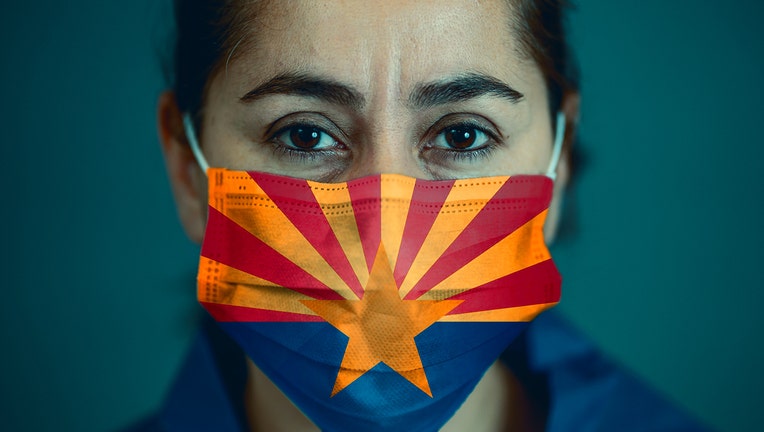Some call for end to coronavirus rules as Arizona cases decline

PHOENIX - Arizona health officials reported just over 80 newly confirmed COVID-19 cases and two deaths on Sept. 8, fueling some business owners to call for an end to operating restrictions.
The Department of Health Services reported an 81 additional cases statewide. The last time the state saw a daily case count below 100 was in March, according to online data.
So far, 5,221 people in the state have died of the disease caused by the coronavirus, and there have been 206,045 confirmed cases. The state, once a national hot spot for infections, continues to see a downward trend in infections and hospitalizations.
SIGN UP FOR FOX 10 PHOENIX EMAIL ALERTS
The number of reported infections is thought to be far higher because many people have not been tested, and studies suggest people can be infected with the virus without feeling sick.
Despite the decline in case and hospitalization numbers, officials warned the public to keep up preventive measures over the Labor Day weekend.
About 100 people, including local business owners, held a "Freedom Rally" on Sept. 7 at the state Capitol, calling for an end to all COVID-19 restrictions.

Group holds ‘Freedom Rally’ outside Arizona State Capitol on Labor Day
Dozens were demanding furloughed workers be allowed to work again during the pandemic.
Attorney General Mark Brnovich recently challenged Gov. Doug Ducey’s executive order allowing some businesses to partially reopen. Brnovich has argued it arbitrarily discriminates against some businesses.
Rick's Pub and Grub in Chandler was shut down after apparently violating COVID-19 restrictions.
For most people, the new coronavirus causes mild or moderate symptoms, such as fever and cough that clear up in two to three weeks. For some, especially older adults and people with existing health problems, it can cause more severe illness, including pneumonia and death.
The Associated Press contributed to this report.

Health workers applaud these seniors defeated COVID-19
Across the world, health workers are applauding older individuals who've recovered from the novel coronavirus.
In order to protect yourself from a possible infection, the CDC recommends:
- Avoid close contact with people who are sick.
- Avoid touching your eyes, nose, and mouth.
- Stay home when you are sick.
- Cover your cough or sneeze with a tissue, then throw the tissue in the trash.
- Clean and disinfect frequently touched objects and surfaces using a regular household cleaning spray or wipe.
- Cover your mouth and nose with a cloth face cover when around others
- Wash your hands often with soap and water for at least 20 seconds, especially after going to the bathroom; before eating; and after blowing your nose, coughing, or sneezing.
- Monitor your health daily
MAP: Worldwide interactive Coronavirus case data
MAP: Arizona Coronavirus cases by zip code
FULL COVERAGE: fox10phoenix.com/coronavirus
CDC: How coronavirus spreads, symptoms, prevention, treatment, FAQ
Arizona COVID-19 resources, FAQ: azdhs.gov/coronavirus
On CoronavirusNOW.com, you'll find extensive coverage about COVID-19, including breaking news from around the country, exclusive interviews with health officials, and informative content from a variety of public health resources.
RELATED:
- Coronavirus in Arizona: Latest case numbers
- Coronavirus: Symptoms, testing and how to prepare amid growing COVID-19 outbreak
- How coronavirus differs from flu: Symptoms to watch for
Symptoms for coronavirus COVID-19 include fever, coughing, and shortness of breath. These, of course, are similar to the common cold and flu.
Expect a common cold to start out with a sore or scratchy throat, cough, runny and/or stuffy nose. Flu symptoms are more intense and usually come on suddenly, and can include a high fever.
Symptoms of COVID-19 may appear more slowly. They usually include fever, a dry cough and noticeable shortness of breath, according to the World Health Organization. A minority of cases develop pneumonia, and the disease is especially worrisome for the elderly and those with other medical problems such as high blood pressure, obesity, diabetes or heart conditions.
RELATED: Is it the flu, a cold or COVID-19? Different viruses present similar symptoms
Right now there's one big difference between flu and coronavirus: A vaccine exists to help prevent the flu and it's not too late to get it. It won't protect you from catching the coronavirus, but may put you in a better position to fight it.
To protect yourself, wash your hands well and often, keep them away from your face, and avoid crowds and standing close to people.
And if you do find yourself showing any of these flu or coronavirus symptoms - don't go straight to your doctor's office. That just risks making more people sick, officials urge. Call ahead, and ask if you need to be seen and where.

